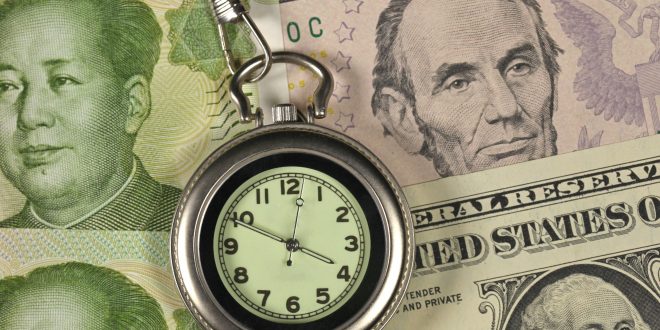There has been some activity as 2020 nears an end, especially with the European Union and the United Kingdom reaching an agreement on Brexit and the congressional approval of the fiscal stimulus package.
The Brexit talks have been marred by some turmoil but ultimately an agreement between the UK and the European Union was reached on Thursday before the UK left the bloc on December 31. There were concerns that an agreement could not be reached, which led to losses in the British pound.
The UK’s final GDP was revised upwards to 16.0% from 15.5%, marking a sharp rebound since Q2 release of -19.8%.
In Canada, Real Gross Domestic Product (GDP) expanded by 0.4% in October to mark its sixth straight monthly growth, the data published by Statistics Canada showed on Wednesday. This reading followed September’s expansion of 0.8%.
The upward movement of real GDP continued to offset the steepest drops on record in Canadian economic activity observed in March and April
The United States’ Real Gross Domestic Product (GDP) expanded at an annual rate of 33.4% in Q3, the US Bureau of Economic Analysis’ third estimate showed on Tuesday. This reading beat the previous estimate and the market expectation of 33.1%.
The Consumer Sentiment Index in the US rose modestly from 76.9 in November to 80.7 in December, the University of Michigan’s latest Surveys of Consumers showed on Friday. This reading came in lower than the market expectation and the previous estimate of 81.3.
US Personal Spending in November declined by 0.4% after rising by 0.3% in October. This reading came in worse than the market expectation for a fall of 0.2%. Personal Income dropped by 1.1% in the same period and missed analysts’ estimate for a decrease of 0.3%
The Personal Consumption Expenditures (PCE) Price Index in November was unchanged as expected. On a yearly basis, the PCE Price Index edged lower to 1.1% from 1.2% in October.
Durable Goods Orders in the United States expanded by 0.9%, or $2.2 billion, on a monthly basis to $244.2 billion in November higher than analysts’ estimate for an increase of 0.6%.
There were 803,000 initial claims for unemployment benefits in the US during the week ending December 19. Better than last week’s print of 892,000 and market expectation of 885,000.
Consumer confidence in the US weakened in December with the Conference Board’s Consumer Confidence Index dropping to 88.6 from 92.9 in November.
The Consumer Confidence Indicator for the euro area rose by 3.7 points to -13.9 in December from -17.6 in November slightly better than analysts’ estimate of -16.8.
Australian Retail Sales soared, led by pre-Christmas shopping in a sign fourth-quarter economic growth will rebound strongly.
Annual turnover jumped 13.2%, led by the country’s second-most populous state of Victoria following the easing of coronavirus restrictions.
The Central Bank of the Republic of Turkey (CBRT) announced on Thursday that it raised its policy (one-week repo) rate from 15% to 17%.
The US government has seen a chaotic end this year after President Donald Trump’s refusal to approve a $ 2.3 trillion financial package led to millions of unemployed Americans losing unemployment benefits and federal agencies facing possible closure due to a lack of funding.
On Sunday, lawmakers from both the Democratic and Republican parties pressured Trump, who leaves office on Jan.20 after losing the Nov. 3 election, to push him to pass the aid and government funding package that Congress approved last week.
The Republican president demanded that Congress change the bill to increase the size of the incentive financial aid to Americans affected by the effects of the epidemic from 600 to 2000 dollars.
Many economists agree on the need to raise financial aid to stimulate the economy again, but they say that immediate support for Americans affected by the pandemic is still urgently needed.
The package includes $ 1.4 trillion in government agency expenditures.
If Trump does not sign the legislation, a partial shutdown of government activities will begin on Tuesday, endangering the entry of millions of employees unless Congress intervenes with temporary action.
The Republicans and Democrats had agreed a few days ago on the financial package with the support of the White House, after months of deliberations.
Trump said the bill allocates huge sums of money for private interests, cultural projects and foreign aid.
Crude Oil Stocks Change in the US was -0.6 million barrels in the week ending December 18, the weekly report published by the US Energy Information Administration (EIA) revealed on Wednesday. Analysts estimate was for a decrease of 3.1 million barrels.
US crude oil refinery inputs averaged 14.0 million barrels per day during the week ending December 18, 2020, which was 169,000 barrels per day less than the previous week’s average.
Coronavirus
on Sunday, the French Ministry of Health announced the registration of 8,822 new cases of Coronavirus during only twenty-four hours, in a sharp rise from the 3093 cases record for a day, with France and many European countries launching a vaccination program.
The South African Ministry of Health said that the total number of coronavirus cases in the country exceeded the one million mark on Sunday, December 27.
South Africa, the hardest hit by the virus on the continent, surpassed the one million mark, only nine days after reaching 900,000 cases.
 Noor Trends News, Technical Analysis, Educational Tools and Recommendations
Noor Trends News, Technical Analysis, Educational Tools and Recommendations





